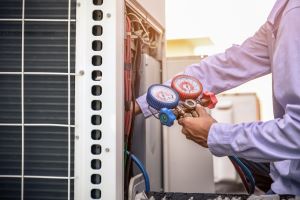How to Select the Right HVAC System for Your Needs
Picking the appropriate A/c system is an essential choice that needs careful factor to consider of various aspects. The myriad of system kinds offered can complicate this process, leading one to question which path ultimately leads to optimal comfort and efficiency.
Analyze Your Home Dimension
Analyzing your home size is an important very first action in picking the ideal heating and cooling system. The size of your home straight influences the heating and cooling ability needed for efficient climate control. A heating and cooling system that is too little will certainly struggle to keep comfortable temperatures, resulting in enhanced energy usage and endure the unit. On the other hand, an oversized system can result in short biking, inadequate moisture control, and inefficient operation.
To properly assess your home dimension, determine the square video of each area, considering elements such as ceiling height and the layout. Furthermore, think about the insulation high quality and the number of windows, as these elements impact thermal efficiency. Residences with open floor plans may need various system arrangements contrasted to those with numerous divided spaces.
Using the Handbook J load calculation approach can give a more accurate estimate of your heating and cooling needs. This method represent numerous elements, including regional environment, solar gain, and occupancy patterns. By very carefully assessing these facets, you can make certain that your picked a/c system is appropriately sized, leading to enhanced comfort, energy effectiveness, and long life of the devices.
Determine Your Budget Plan
Establishing your budget is a crucial action in the cooling and heating system selection procedure, as it establishes the parameters for your options - DMAKS HVAC. A cooling and heating system is a considerable financial investment, and understanding your financial restrictions will certainly aid limit options that fit within your methods
Begin by examining not just the preliminary purchase price but also setup costs, which can differ considerably depending on the complexity of the project. Take into consideration continuous expenses such as upkeep, repair work, and energy intake. A system might show up affordable originally yet can bring about higher prices gradually if it is much less effective.
It is recommended to assign a contingency fund for unanticipated costs that may develop throughout setup or preliminary system adjustments (DMAKS HVAC). Additionally, discover financing choices or refunds that might be readily available, as these can reduce the concern of ahead of time costs
Ultimately, having a clear spending plan allows you to engage with cooling and heating experts better, ensuring you obtain tailored suggestions that aligns with your monetary objectives and home requirements. By being persistent concerning your budget, you can make educated decisions that improve comfort without jeopardizing monetary stability.
Evaluate Energy Efficiency
Energy performance plays a vital duty in the overall efficiency and cost-effectiveness of your HVAC system. When choosing a system, it is vital to consider its energy efficiency rankings, as these numbers directly influence your utility bills and environmental impact. Try to find systems with a high Seasonal Energy Efficiency Ratio (SEER) for cooling down and a high Annual Gas Usage Effectiveness (AFUE) rating for home heating. Higher ratings show higher efficiency, indicating more comfort for less power intake.
In addition, take into consideration the Energy Star certification, which represents that the system meets stringent performance guidelines established by the Epa. Buying a Power Star-rated HVAC system can lead to substantial savings over time, especially in areas with extreme temperature fluctuations.
Another variable to examine is the system's dimension and capability. An oversized or small system can lead to inadequacy and raised power prices. DMAKS HVAC. Proper sizing, frequently figured out via a Hands-on J lots calculation, makes certain that the system runs at optimal performance


Think About Climate and Environment
When picking an a/c system, it is essential to consider the neighborhood environment and environmental conditions, as these read aspects substantially affect the system's efficiency and performance. Different areas experience varying temperature extremes, humidity levels, and seasonal changes, every one of which effect home heating and cooling down needs.

Furthermore, regional ecological variables, such as air quality and prospective allergens, should inform your selection. Solutions geared up with innovative purification modern technologies can assist mitigate toxins and give cleaner air. Furthermore, think about the energy resources available in your area-- some HVAC systems are extra effective when powered by all-natural gas or renewable resource resources.
Eventually, straightening your HVAC system choice with your neighborhood climate and ecological considerations will lead to boosted convenience, enhanced performance, and lower energy prices.
Explore System Types and Functions
As property owners seek to optimize convenience and efficiency, exploring the various sorts of heating and cooling systems and their special attributes becomes vital. The key kinds of HVAC systems consist of air conditioning, heatpump, ductless mini-split systems, and heaters. Each system uses distinct benefits tailored to different needs and choices.
Central air conditioning systems supply consistent cooling throughout a home, making them ideal for larger rooms. Heatpump function as both heating and cooling services, utilizing electricity to move warm, which can lead to lower power expenses. Ductless mini-split systems are becoming increasingly prominent due to their flexibility and ease of installment, permitting property owners to manage the temperature why not look here in individual spaces without substantial ductwork.

Verdict
To conclude, selecting the suitable cooling and heating system demands careful consideration of different aspects, consisting of home dimension, budget restrictions, power efficiency, local climate, and offered system kinds. A thorough evaluation of these aspects ensures optimal convenience and cost-effectiveness. By complying with a structured method, homeowners can make informed decisions that align with their certain requirements and preferences, eventually causing enhanced indoor air top quality and energy savings.